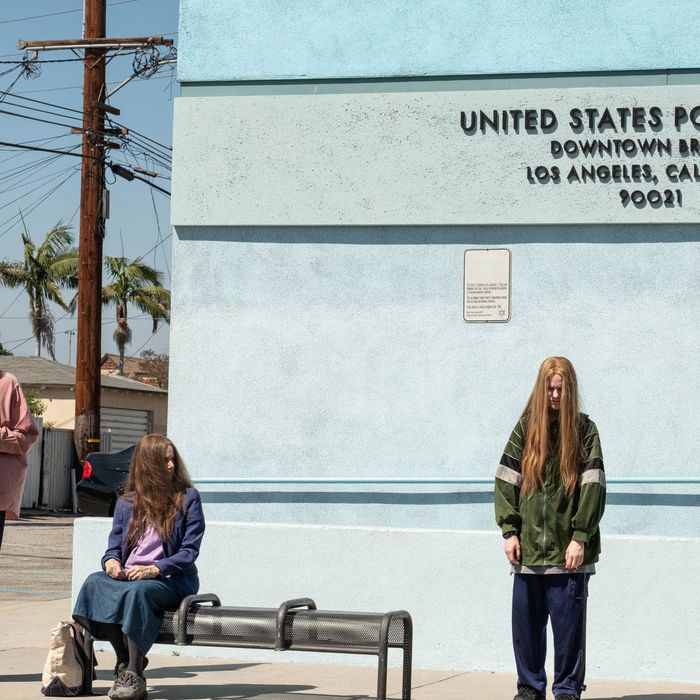With Kajillionaire, Miranda July Returns with What Might Be Her Best Film Yet

This review originally ran during the Sundance Film Festival but has been republished ahead of the film’s theatrical release.
Miranda July’s previous directorial feature, The Future, premiered at Sundance nearly a decade ago, and even though she’s returned to the fest since then as an actor, it’s tempting to think of her as someone whose style has gone out of … well, style. Those days of cleverly conceived, ornate miniatures — the era of that vague, dismissive moniker “twee” — seem light years away. But re-watching her earlier work recently, I was struck by how much tougher it was than I remembered. July’s broken characters might do odd, sometimes precious things, but they do so because they seem incapable of living in the world; it’s like they missed the middle-school assembly where we were all taught how to function in society. All her movies are about our search for experiences or people to hold the vast awkward darkness at bay — our longing for a happy place. When seen in that light, the work seems more essential than ever.
Which brings us to July’s latest directorial outing, Kajillionaire, combining her fondness for gentle absurdism with a dead-end atmosphere that feels both of the moment and, curiously, timeless. Probably the most plot-driven film she’s made to date (though “plot” is a relative term when we’re talking about Miranda July), it follows a family of not-very-good-but-thoroughly-committed con artists who barely scrape together a living on the streets of Los Angeles. In the opening scene, we see them standing at a bus stop outside a post office, unconvincingly pretending to be strangers. They bark out orders with military precision: “15 seconds … now!!” And when it’s time, the daughter (Evan Rachel Wood playing a character named Old Dolio) launches into a ridiculous acrobatic routine that is presumably designed to evade cameras but actually looks like we’ve wandered into an impromptu street performance.
And all this for what? Old Dolio enters the building, goes into her post office box, then reaches all the way in and steals whatever’s in the adjacent box. It’s a total crapshoot, and predictably, it yields little loot — just a tie that her father Robert (Richard Jenkins) notes is not cheap, adding, “You can’t see it because you are not of gentle birth.” We learn that they owe $1,500 in overdue rent to their hilariously whimpery-voiced landlord, who lets them stay in an empty dorm-like space where the walls are overrun several times a day by a pink cascade of soapy suds, which they ritually gather into buckets and dump down a drain. What??
This all sounds very cute, and your mileage may well vary; I found it mostly hilarious. But it also feels like an escalating anxiety dream. July is so good at keeping us off-edge: Most directors not named David Lynch wouldn’t be able to handle just one of these aforementioned surreal elements — they’d either overplay it, or underplay it — but July effectively immerses us in this defiantly unpredictable world. Her treatment of the material is narratively matter-of-fact, but visually precise: Like a good comedy director, she frames the characters’ weird interactions and movements in such a way as to make sure we get the gag, but she doesn’t dwell too long on any of it. She keeps things moving, and soon enough, the strangeness just becomes part of the movie’s reality. We go with it.
All shaggy clothes, grimaces, and long straight uncombed hair, the rough and reserved Old Dolio’s life starts to change when her parents befriend the outgoing, charming Melanie (Gina Rodriguez), whom they rope into a scheme involving airline insurance and reimbursement for lost luggage. At first, she’s wary of this new addition to their little universe: “How is this person an asset?” she asks. But part of her problem is that she’s begun to long for some parental tenderness. Early in the film, she sits in on an expectant mother’s “positive parenting” class in exchange for some money. As she watches videos of a newborn baby crawling on its mother’s belly to find a breast to feed on, a primal urge sets in: She longs to be closer to her mom Theresa (Debra Winger). But her parents seem incapable of showing any affection. Their emotional vocabulary begins and ends with survival, danger, and death. Every once in a while a tremor hits the city, and whenever it happens the family freezes in its tracks, terrified and hesitant; Robert has been repeatedly warning them about the “big one” that’s coming, which he believes will wipe humanity out. This millennial mentality (in the old sense of the word) has stripped their lives of any meaning, or love, or responsibility — though we may also wonder if the characters’ certainty about imminent apocalypse, their rejection of social norms and behaviors, is its own evasion tactic.
Kajillionaire is, ultimately, Old Dolio and Melanie’s story: the tale of a grunty, near-feral child who meets her polished, happy-go-lucky diametrical opposite and sees in her both an opponent and, maybe, cause for hope. To say too much more would be revealing some of the movie’s marvelous third-act surprises, so I’ll just say that July takes these weird, desperate characters and gives their lives a couple of cosmic twists that serve both to clarify her vision and to expand it. This might be her best film yet.
MORE MOVIE REVIEWS
- Ava Didn’t Have to Be a Catastrophe
- Aaron Sorkin’s Annoying Tics Are Actually Good in The Trial of the Chicago 7
- Enola Holmes Is Millie Bobby Brown’s Show, and She Owns It
